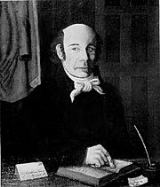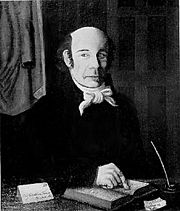
Jonathan Fisher
Encyclopedia

Congregational church
Congregational churches are Protestant Christian churches practicing Congregationalist church governance, in which each congregation independently and autonomously runs its own affairs....
minister from 1794 to 1837 in the small village of Blue Hill, Maine
Blue Hill, Maine
Blue Hill is a town in Hancock County, Maine, United States. The population was 2,390 at the 2000 census. It is home to Blue Hill Memorial Hospital, George Stevens Academy, the now-closed Liberty School, New Surry Theatre, Kneisel Hall, Bagaduce Music Lending Library, the Kollegewidgwok Yacht Club...
in the United States
United States
The United States of America is a federal constitutional republic comprising fifty states and a federal district...
. Although his primary duties as a country parson engaged much of his time, Fisher was also a farmer, scientist, mathematician, surveyor, and writer of prose and poetry. He bound his own books, made buttons and hats, designed and built furniture, painted sleighs, was a reporter for the local newspaper, helped found Bangor Theological Seminary, dug wells, built his own home and raised a large family.
Truly a renaissance man in the breadth of his accomplishments Fisher invites comparison with a Franklin or Jefferson. In his manners, morals and writings Fisher represents the best of the vigorous New England churchmen who shaped the standards of their congregations during America's formative years.
Biographical information
Jonathan Fisher was born in New Braintree, MassachusettsNew Braintree, Massachusetts
New Braintree is a town in Worcester County, Massachusetts, United States. The population was 999 at the 2010 census.- History :New Braintree was first settled in 1709 and was officially incorporated in 1751....
in 1768 and reared in the home of his uncle a minister, because his father, a Revolutionary War
American Revolutionary War
The American Revolutionary War , the American War of Independence, or simply the Revolutionary War, began as a war between the Kingdom of Great Britain and thirteen British colonies in North America, and ended in a global war between several European great powers.The war was the result of the...
soldier had died. As a young man he considered becoming a blacksmith, cabinet maker or clockmaker, but his intellectual gifts were evident and his family was able to send him to Harvard in 1788. He studied liberal arts and divinity, supporting himself by waiting on other students in the dining hall. During this time he developed a curious shorthand or code in which his notes were kept.
He came to Blue Hill Maine in 1796 as the first settled pastor of the Congregational Church. By November 2, 1797, his original house was completed by the work of his own hands, aided by those of his parishioners. The first house, which was in use for 100 years, was unfortunately torn down by a Fisher descendant in 1896. It formed the shell of the present house which was begun in 1814, again largely by the parson himself. His skill and taste as a builder and designer are evident in its rooms.
The Reverend Jonathan Fisher, Master of Arts, a degree and title in which he took much pride, was a most unusual and remarkably gifted man. When at the close of the 18th century he came to Blue Hill, then a frontier village 'in a wilderness", he was seemingly leaving behind him all those intellectual and artistic pursuits and resources in which he delighted. Yet, instead of leaving these in the "Seat of the Muses", which was his name for Harvard College and Cambridge, he transported them to his lonely, far-flung parish, and with no little success, grafted many of them upon the people, and upon the pioneer institutions of his new charge.
A student of languages all his life, he did not neglect his Hebrew, his Latin, or his Greek. In his study on the right entrance to his house, he read his Hebrew Bible at five o'clock each morning, in winter by the light of his "blazing logs"; his Latin and Greek he taught to four or five young men, who usually boarded with him and his own large family. Devoted to drawing and painting, he somehow managed to pursue these arts even in Blue Hill.
Industrious almost beyond belief, and possessed of an unflagging physical vitality, he relieved his omnipresent poverty and increased the few hundred dollars of his meager salary by farming his own acres, concocting medical remedies, braiding numberless straw hats, sawing out buttons from the bones of farm animals, and even of dead household pets, painting names on vessels or painting sleighs (at $2.50) each, making pumps, chairs, chests, hair-combs, tables, bureaus, bedsteads, cradles, even drumsticks for the local militia (at 25 cents a pair), and by repairing much of the shaky furniture in Blue Hill. And, with all these labors, he found time to write many poems, and several books!
Nor were his activities confined to his parish. Although he nurtured its library, was the power behind its Academy, founded in 1803 (in which he encouraged "the fine arts" as well as the study of classics and mathematics), and watched over the minds as well as the souls of its people, he went on long missionary journeys, was an active Trustee of the Bangor Theological Seminary (and an untiring beggar for its needs as well!). He was an ardent speaker and writer in the cause of bettering the lot of the Negroes and sponsored from its beginning the American Society for the Colonization of Liberia.
Through these and other labors both and home added immeasurably to the cultural dignity of this village for more than half a century. Blue Hill still respects and honors him.
Mary Ellen Chase, JONATHAN FISHER: MAINE PARSON 1768 - 1847
The Blue Hill Congregational Church
No one can hope to understand Jonathan Fisher unless they realize that first and foremost he was a Calvinist minister. He lived his life in obedience to the precepts of his religion and did his utmost to defend the faith as he understood it. In his writings, his artwork, but perhaps most of all in the example of his life he strove to center his attention on his religious duties.The Calvinist's believed that the chief end of man was "to know and do the will of God". Fisher constantly chided himself for his pleasure in "temporal" matters such as painting, mathematics, etc. which he believed took away from his primary religious responsibilities both to himself and his congregation.
In Jonathan Fisher's time the Calvinist religion was strong throughout New England
New England
New England is a region in the northeastern corner of the United States consisting of the six states of Maine, New Hampshire, Vermont, Massachusetts, Rhode Island, and Connecticut...
. It was a stern religion, even by the standards of the day. Calvinists believed that God is infinite and transcendent. To know the will of God is man's supreme end. This will is known to man through the scriptures, whose writers were "sure and authentic amanuenses of the Holy Spirit". While God is the source of all good, man is guilty and corrupt from birth. To redeem man, the Son of God became incarnate in the person of Jesus Christ
When man is united to Christ, the benefits of salvation are achieved. This union is achieved only through the special operation of the Holy Spirit in the faithful. This assurance which the believer has of salvation rests on the divine choice of the man to salvation; and this falls back on God's eternal sovereign purpose, whereby He has predestined some to eternal life and some to eternal death. The former he calls to salvation, and they are kept by him in progressive faith and holiness.
The Calvinist Church is universal, with the multitude gathered from diverse nations agreeing on the tenants of one common faith. This universalism may explain why Fisher campaigned so strongly for better treatment for Native Americans. He was also very active in the attempt to eliminate slavery by proposing that slaves be purchased from their owners and sent back to Africa as free men and women.
The pastor played a central role in the Calvinist Church. He not only administered the sacraments, but also was responsible for maintaining church discipline - admonishing, or even excommunicating those who failed to abide by church doctrine. Over time and as new sects such as the Baptists entered the Blue Hill region, the severity of the Calvinist doctrine became less acceptable to the congregation. Fisher however, never wavered from his sense of duty. "Father" Fisher as he liked to be called spent his years supporting and maintaining the faith that he first embraced as a young man.
Jonathan Fisher's Notebooks and Journals
Throughout his life, Fisher kept a daily journal, and copies of all his letters, providing an almost unparalleled glimpse into a life in Federal era New England. His notebooks and sketchbooks record his observations and interests in scientific matters, surveying, engineering, mathematics, geometry, agriculture, and natural history.Writings by Jonathan Fisher
- Scripture Animals, or Natural History of the Living Creatures Named in the Bible Written Especially for Youth Illustrated with Cuts. By Jonathan *Fisher, A.M. Portland, Published by William Hyde, (1834)
Jonathan Fisher Bibliography
- Jonathan Fisher, Maine Parson, 1768-1847- Mary Ellen Chase, New York, MacMillan Company (1948)
- Index to Mary Ellen Chase Jonathan Fisher, Maine Parson prepared by Rev. Gary Vencill http://www.jonathanfisherhouse.org
- Let Every Hour Be Filled to the Brim , Down East Magazine Article, September, 1995
- Historic Maine Parsonage - The Jonathan Fisher House, Blue Hill, Maine - article by Esther E. Wood, Daughters of the American Revolution Magazine, August–September 1961
- A Lantern in the Wind - The Life of Mary Ellen Chase - Elienne Squire, Fithian Press, Santa Barbara - (1995).
- Head of the Bay - Sketches and Pictures of Blue Hill, Maine - Annie L. Clough The Shoreacre Press, (1953)
- Maine in the Early Republic: From Revolution to Statehood - Chapter 11, 'Jonathan Fisher and the 'Universe of Being' by Richard Moss. University Press of New England (1988).
- Versatility Yankee Style: the Cultural Diversity of Rev. Jonathan Fisher, John H. Bellamy and the Hardy family (1977)
- The Language of Jonathan Fisher, 1768-1847 (1985)
- Versatile Yankee: The Art of Jonathan Fisher, 1768-1847 by Alice Winchester. Princeton, NJ, Pyne Press, 1973
- Biographical Sketch of the Rev. Jonathan Fisher of Blue Hill, Maine by Gaylord Hall (1945)
- Memoir of Rev. Jonathan Fisher of Blue Hill, Maine (1889)
- "The House the Parson Built" by Abbott Lowell Cummings. Old Time New England Magazine, Volume: 56 Number: 204, Spring, 1966
- The Philosophical Alphabet of Jonathan Fisher by Raoul N. Smith, Lee Pederson American Speech, Vol. 50, No. 1/2 (Spring - Summer, 1975), pp. 36–49
- Property and Progress: Antebellum Landscape Art and Property Law
The Historic Jonathan Fisher House and Museum
The Jonathan Fisher Memorial, Inc.,
44 Mines Road, PO Box 537, Blue Hill, Maine 04614
More information about Jonathan Fisher is available at:
Jonathan Fisher House

